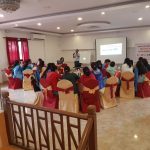This is a brand new session for 2021-22 – providing an introduction to what is involved when developing mutually beneficial research partnerships with communities. It will also help you decide whether it is the favoured approach for you and your community partners.
The session will be delivered by the National Coordinating Centre for Public Engagement and is aimed at those working in universities who want to know more about community engagement and are interested in the potential of applying a community-engaged research approach.
Learning objectives:
- Consider your knowledge and understanding of community engagement and community engaged research
- Explore the continuum of collaborative research with communities
- Think about what helps to build strong community engagement and enhance your skills by experimenting with these ideas
- Reflect on how community engagement relates to your own work and roles.
By the end of this session, you will:
- Understand how community engagement works
- Be aware of how community engagement relates to your own work
- Have an understanding of what makes strong community engagement
| Workshop | Date | Time | Location |
|---|---|---|---|
| Introduction to Community Engagement | Monday 14th March 2022 | 14:00 – 16:30 | Online |
To book a place on this workshop please complete the booking form.
For any queries, please contact Organisational Development.
 RKEDF Workshop: Introduction to Community Engagement
RKEDF Workshop: Introduction to Community Engagement RKEDF Workshop: From Public Engagement to Impact – Monday 5 December 3-4pm
RKEDF Workshop: From Public Engagement to Impact – Monday 5 December 3-4pm










 BU academic publishes in online newspaper in Nepal
BU academic publishes in online newspaper in Nepal Final day of the ESRC Festival of Social Science
Final day of the ESRC Festival of Social Science Using Art to enhance Research
Using Art to enhance Research Register now to attend the 17th Annual Postgraduate Research Conference – Wednesday 3 December 2025
Register now to attend the 17th Annual Postgraduate Research Conference – Wednesday 3 December 2025 ECR Funding Open Call: Research Culture & Community Grant – Application Deadline Friday 12 December
ECR Funding Open Call: Research Culture & Community Grant – Application Deadline Friday 12 December MSCA Postdoctoral Fellowships 2025 Call
MSCA Postdoctoral Fellowships 2025 Call ERC Advanced Grant 2025 Webinar
ERC Advanced Grant 2025 Webinar Horizon Europe Work Programme 2025 Published
Horizon Europe Work Programme 2025 Published Horizon Europe 2025 Work Programme pre-Published
Horizon Europe 2025 Work Programme pre-Published Update on UKRO services
Update on UKRO services European research project exploring use of ‘virtual twins’ to better manage metabolic associated fatty liver disease
European research project exploring use of ‘virtual twins’ to better manage metabolic associated fatty liver disease